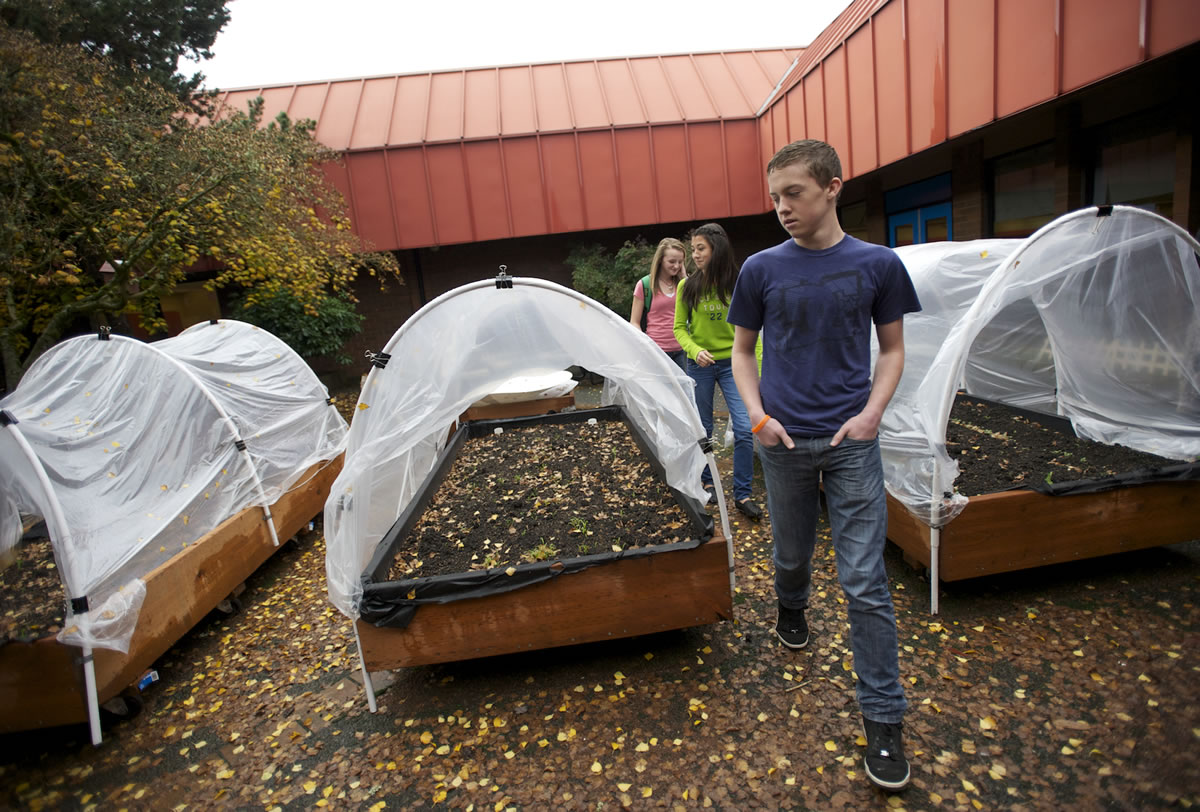The lonely, empty courtyard of Wy’east Middle School is looking a little happier — and healthier — these days.
A trio of raised beds has poured forth carrots, kale, spinach, strawberries, beets and peas. Next year, there’ll be even more coming out of these boxes of ground.
All of which is thanks to a grant written by seventh-grade students and approved by the Vancouver Watersheds Alliance, a nonprofit group that pulls together volunteers, projects and the local need to clean up groundwater.
The $1,500 Neighborhood Sustainability Grant paid for building materials for three beds and plastic winter covers, a big rain barrel and several freestanding rain “saucers” that collect and funnel precipitation. The Wy’east students also planted two berry bushes and held a “bread and jam” class in which they learned to make their very own; the jam wasn’t harvested from the on-site fruit, but in future years, it will be.
What was harvested on-site, and put to good use, was produce that went directly into the backpacks of needy Wy’east students as part of the Share Backpack Program — discreetly sending weekend food home with 1,300 students at 62 local schools.
Sunrise O’Mahoney, who recently moved up from office manager to executive director of VWA, said she wants Vancouver neighborhood associations to know that her agency accepts grant applications on a rolling basis.
“As long as we have funds, you can apply,” she said.
The city of Vancouver provides the vast majority of the VWA budget — $178,800 this year, according to O’Mahoney. Of that amount, $18,000 was dedicated to Neighborhood Sustainability Grants.
The overall theme is grass-roots sustainability and eliminating what’s called “non-point-source” water pollution, O’Mahoney said. That’s a technical term that simply means the pollution spilling not from factory pipes or waste dumps
but from small, diffuse sources: residential and agricultural fertilizers, herbicides and insecticides; oil and grease from city streets; erosion from stream banks; bacteria and nutrients from livestock; leaking septic systems and pet waste, for example.
The grants are limited to $1,500 each, and matching funds are required — but the match “is almost always through volunteer hours and in-kind donations of materials,” O’Mahoney said.
At this point, since the Alliance budget comes almost entirely from the city of Vancouver, only organized city neighborhood associations are eligible to apply for grants. O’Mahoney said funding that extends the group’s efforts beyond the city limits is more than welcome. Multiple neighborhoods can come together to propose larger projects for a larger price tag. In the case of the Wy’east raised beds, students took their idea to the Ellsworth Springs Neighborhood Association for a sign-off; next year, teacher Erin Lark said, the larger community will be invited in over the summer to help keep the beds busy, community garden style.
Community gardens are a big part of what the Neighborhood Sustainability Grants are helping to spread across the city. So far this year, four grants have paid to set up community gardens in neighborhood parks or vacant lots in the Arnada, Bella Vista and Landover-Sharmel neighborhoods, as well as here in Ellsworth Springs. The Central Park Neighborhood Association got a community composting program at Clark College, with the college’s Environmental Club in the driver’s seat.
Also, the First Place Neighborhood Association got 900 feet of soft park path, decreasing the amount of stormwater runoff heading for underground storm drains; and the Airport Green Neighborhood Association received $650 to offset the cost of new yard and street trees through nonprofit Friends of Trees.
“We’re just trying to raise community awareness of all the ways we impact the watershed,” O’Mahoney said.
That means everything from scooping up your dog’s poop and removing invasive species to focusing on the overall water quality of Vancouver Lake and Burnt Bridge Creek. O’Mahoney said she is eagerly awaiting a spring report on the creek that will help her agency firm up more volunteer projects it wants to undertake.
Twice a year — on the Martin Luther King Day of Service in January and Make a Difference Day in October — the alliance gathers hundreds of volunteers to plant thousands of trees along Burnt Bridge Creek. During the rest of the year, she said, volunteers and projects of all shapes and sizes are welcome. There’s been Girl Scout gaggles with just five little helpers looking to get involved with a neighborhood cleanup project; there’s been huge employer-sponsored volunteer efforts underwritten by businesses such as New Seasons supermarket and Kaiser Permanente.
“We really like to build these partnerships with employers and other groups in the area,” O’Mahoney said.
She said she’s working now on a portfolio of local projects that’ll be ready to go whenever volunteers come knocking.
Back at Wy’east, the seventh-grade students who made the raised-bed grant happen are now eighth graders — already taking some satisfaction in a job well done. They are Reilly Dale, Grace Taylor and Carter Wood; another student, Kerri Honn, was also integral to the project but doesn’t attend Wy’east anymore.
Wood said he was most surprised at how quickly the beds burst forth with healthy, flavorful food.
“It was interesting to learn how easy it is to make something healthy,” he said.
And is he eating healthier as a result?
“A little bit,” he admitted.




